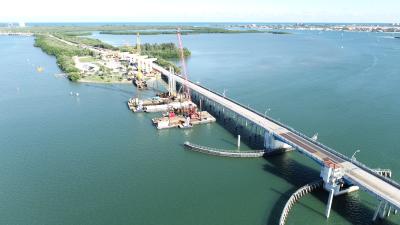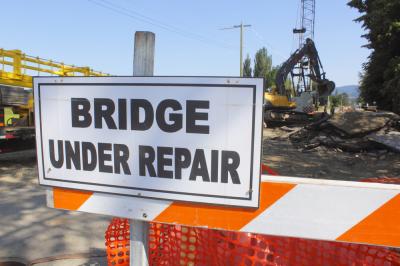Katrina, the Category 4 hurricane that slammed into the Gulf Coast just before Labor Day, continues to not only cripple Louisiana, Mississippi and Alabama, but to leave its mark on the entire nation’s economy as well as numerous business industries. Perhaps most noticeably, fuel shortages and escalating fuel costs have threatened to critically impact the construction industry.
Potential Shortfalls
South Carolina’s Department of Transportation is considering halting projects because they say contractors don’t have enough fuel to continue working. Danny Shealy, director of construction for the Transportation Department, said the decision to stop work depends on fuel availability.
A heavy crude oil shortage linked to Katrina forced one of the state’s largest road-building companies to close asphalt plants in early September, with other asphalt plants closing their doors within days, reported the DOT.
“Asphalt is a byproduct of the petroleum industry,” explained Steve Gennett of the Carolinas AGC (Associated General Contractors).
So are roofing shingles and tar paper. “People don’t realize that crude oil has a lot of uses in the construction industry,” he said
The Carolinas AGC, representing approximately 3,000 highway building and utility companies in the Carolinas, said roughly half a dozen large contractors across the state could not get sufficient fuel supplies. Sammy Hendrix, South Carolina branch director, told reporters that many contractors were quickly running out of fuel, and that if they couldn’t replenish supplies, projects would “have to stand still for a while.”
Buncombe, NC, County Manager Wanda Greene delayed inspections of new construction projects. Throughout the state, city and county officials attempted to combat the threat of shortages by conserving, stockpiling and eliminating nonessential driving even as gas stations began closing.
“We don’t have a shortage of gasoline,” said Bill Weatherspoon, executive director of the North Carolina Petroleum Council. “We have a delivery problem.”
Delivery problems are long-reaching, with gas stations as far north as Milwaukee and as far west as Phoenix out of fuel. Circle K Stores Inc. reported outages at 10 to 15 percent of its 256 service stations in one Arizona county alone.
One Florida contractor who declined to be named cancelled an order for four graders out of concern about being able to get fuel for them. In Miami, Robert Lopez, president of General Asphalt Co. Inc., struggled to find diesel for dump trucks and asphalt-laying equipment. The contractor, who resurfaces roads and airport runways, typically receives diesel from Marathon Oil, but was told its supply was being restricted. Lopez turned to fellow contractors for 7,500 gallons of diesel, but that was expected to last only a matter of weeks.
The closure of refineries and offshore oil platforms, in addition to major failures in the Colonial and Plantation pipelines in the southeastern U.S. directly impacted fuel availability. Army and Air Force Exchange Service officials stress that the shortage is not a limited regional issue; it is a national matter that could affect at least 40 states.
According to the U.S. Minerals Management Service, 95 percent of the Gulf of Mexico’s oil output and more than 88 percent of natural gas production were shut down in the wake of Katrina –– approximately 1.4 million barrels per day, or 7 percent of U.S. domestic demand, which is roughly the same amount held in reserve by OPEC.
While the hurricane represented a supply shock due to the sudden cut in oil production at a time when global demand for crude has strained the limits of available supplies, experts warn that Katrina’s real threat could extend well beyond a cut in crude oil production.
“Crude’s only half the story,” said James Burkhard, director of global oil market research at Cambridge Energy Research Associates.
“If a refinery sustains significant damage, we cannot replace it quickly.”
Some fear a repeat of last year’s complications after Ivan, when inspectors discovered unexpected damage. The storm had triggered undersea mudslides that scrambled the network of pipelines connecting offshore oil rigs to the coast, keeping an estimated 44 million barrels of crude off the market from September 2004 through February 2005.
Repairs went on for months and crude oil prices reached $50/barrel for the first time. Morningstar research firm analyst Mark Uptigrove thinks Katrina’s devastation will be worse than Ivan’s.
“It was closer to the heart of the offshore production area, so we think the potential for damage is significant,” he said.
Ken Simonson, AGC economist, said it’s difficult to predict the supply situation, but since the restoration of the two biggest pipelines serving the east coast, and with electricity restored up to 80 percent, the situation is no longer as dire as it was immediately following Katrina.
However, he cautions that the loss of refining and pumping capacities could continue to create spot shortages and exert pressure on prices.
“We have to make sure our fuel supplies stretch,” he said. “Right now it’s reliant on the distribution system.”
As of mid-September, both Simonson and Gennett said no one had reported any fuel shortages.
“The radical cuts in fuel allocation have been softened since the Colonial line got going again,” explained Gennett. “It really hurt asphalt operations and trucking fleets, but no one’s parked; they’re careful about how they manage the workload.”
No Shortage of Shortages
Mike Dunham, Georgia AGC, says no projects have been cancelled or delayed … yet. The problem, however, isn’t a shortage of fuel. It’s a shortage of supplies.
“Materials are in short supply, even at an escalated cost,” he said. “Roofing materials particularly are in short supply. There are homes in Florida that still have tarps two years after storms. Getting raw materials in is tough. Even getting dump trucks is tough. ”
Dunham explained that most of Jacksonville’s dump trucks went to Miami to pick up hauling contracts, leaving contractors in Jacksonville truck-less.
Plywood, engineered wood panels (OSB: oriented-strand board), gypsum board and sheet rock prices doubled as Katrina approached, and the materials are now in short supply due to heavy demand.
One lumber supply store owner said the shortage is man-made, driven by panic, but some wood manufacturers who experienced power outages and shutdowns during the hurricane are struggling to catch up.
Georgia-Pacific lost seven to 10 days of production after Katrina, according to executive vice president Dave Paterson. Demand is so great, the company brought two idled Mississippi plants back into production.
Others said the supply is intact, but prices have skyrocketed. Kim Drew, a spokesperson for Southern Pine Council, a New Orleans-based trade association, said the full industry impact remains unclear.
“We don’t know the physical impact on trees, land and sawmills,” Drew said.
The impact on cement is well known, however. A shortage that began a year ago due to other hurricanes, high demand from China and assorted problems at several U.S. and Mexico plants has been exacerbated by Katrina.
Ready Mixed Concrete Co., Denver’s third-largest concrete supplier, resorted to importing cement from Thailand a few months ago, according to general manager Rick Parks. Yet construction projects are still delayed due to cement shortages, and now Hurricane Katrina shut down ports along the Gulf Coast, further affecting cement imports.
Because New Orleans is the key entry port for steel imports, and is a thoroughfare for lumber and other building products, short-term shortages can be expected. Steel prices have already jumped 7 percent since Katrina, and are expected to continue spiraling. American Steel Inc. co-owner Bill Kronmiller says fuel prices have driven up freight costs 20 to 30 percent because “so many truckers are hauling materials down to Louisiana.”
“The port of Orleans is the fourth largest in the country,” said Derrell Cohoon, CEO of Louisiana AGC. “It’s a big economical driver that sees building materials, diesel and coffee go through.”
Although it reopened on a limited basis before Hurricane Rita struck, Cohoon said to expect short-term supplies of steel, sheet rock and concrete to be scarce.
“We have to do some strategic thinking on short-term issues … and there are a lot of issues,” he said.
One issue –– another shortage –– is skilled labor. Cohoon reported that construction firms from 13 Louisiana parishes relocated in Baton Rouge, Gonzalez and Port Allen, but many workers have left the region.
“We want evacuees to come back, and we welcome other qualified workers from other states,” Cohoon said. “We hope to attract people to the industry, and President Bush’s job-training program for displaced residents might give us the boost we need to maintain and retain the skilled craftsmen it’s going to take to complete this five-year program of reconstruction.”
Gennett said Gulf Coast contractors came to the Charlotte coliseum, where about 1,000 evacuees had gathered, to hire workers.
“People are in short supply,” Dunham said. “Florida was already short from last year’s hurricanes. Now, it’s more strained.”
He added that companies feeling the economic pinch of higher prices since Katrina are not cutting jobs, but they are cutting back on perks.
“They’re re-evaluating things like unlimited credit cards, travel and the number of people used on jobs or sent to meetings,” he said. “It’s like when healthcare went up and employers limited coverage. You have to manage the expense of employees. With costs across the board going up, it increases overhead, eats at a company’s profit margins, and makes it hard to be competitive.”
From Shortage to High Prices
With the full extent of the damage done by Katrina to offshore oil rigs still not completely known, uncertainty about availability pushed prices higher.
“There’s no question that ultimately Katrina will have some kind of impact on the industry. We’re at the tip of the iceberg of understanding the full implications,” said Gennett.
While he admits that contractors will be forced to reduce margins to absorb costs, he said he hasn’t “heard any big ’ouches’ yet.”
Others have. Fuel prices are up, so the cost of delivery of materials goes up. It’s called the ripple effect.
“I haven’t heard from a single member about supplies,” said Dunahm. “Just cost increases. Companies are putting on fuel surcharges, or just charging more for delivery. It’s tough on companies who bid on jobs, only to have prices escalate later.”
Gennett said it’s always been a risky business.
“Contractors are risk-takers; they’re used to living like this. There has always been an element of risk in speculative bidding based on the cost of materials,” he said.
However, he said that Katrina has caused many contractors to re-evaluate how they price.
Prices, taxes and wages are all being re-evaluated, along with the full economic impact of Katrina and its successor, Rita. President Bush suspended the 1931 Davis-Bacon Act requiring federal contractors to pay workers at least the prevailing wages in the area where to federally funded construction projects such as highways and bridges are being conducted Bush’s executive order suspends the requirements for contractors rebuilding designated storm-damaged areas in the aftermath of Hurricane Katrina to pay below the prevailing wage.
While organized labor and congressmen called for Bush to rescind what Rep. George Miller of California called a “colossal mistake,” Cohoon said it “doesn’t mean a lot from our perspective” because “the shortage of skilled workers means the market will dictate the wage rate.”
In response to gas prices as high as $5 and $6 per gallon, Georgia’s governor cut his state a break by ordering a moratorium on the collection of the state gas taxes until the end of September. By temporarily eliminating the 7.5 cents-a-gallon excise tax and 4 percent sales tax on gasoline, Gov. Sonny Perdue expects the state to forfeit about $75 million in tax revenue, but said, thanks to financial reserves, “we can afford and we should give Georgians this emergency tax relief.”
With gas prices rising 50 cents or more overnight after Katrina struck land –– on top of a 40 percent price rise in the last year, according to Energy Department figures, contractors and residents of every state could use a break.
One form of intended help is a federal loan of oil from the Strategic Petroleum Reserve to refiners facing shortfalls. Saudi Arabia, OPEC’s biggest crude oil producer, pledged an additional 1.5 million bpd.
Another offer of help comes from the Environmental Protection Agency, with its promise to temporarily allow gasoline retailers nationwide to sell fuel that doesn’t meet stringent summer air-quality standards.
“The EPA waiver was a big move,” said John Kilduff, an analyst at Fimat USA in New York.
Rita
Days before Rita spiraled into a brief Category 4 hurricane barreling toward the heart of the country’s oil production, Gennett was already expressing concern.
“Gas prices are going to spike again when Rita goes back through the oil fields,” he said.
Bill O’Grady, energy futures market analyst at A.G. Edwards in St. Louis, said Houston is home to 20 percent of U.S. refining capacity, adding, “Of the 11 largest refineries in the U.S., six are in the path of Rita.”
He noted that multiple storms have hit the region in a single season before, but said they have never been this powerful.
“We’re barely recovering from the first.”
Chevron had just resumed 56 percent of its pre-Katrina production levels when it evacuated personnel from offshore rigs and platforms for the second time in less than a month. Exxon Mobil closed the biggest U.S. oil refinery. In total, 26 refineries, with a capacity to produce 26 percent of U.S. crude oil, did the same.
“This has our attention,” said Bob Slaughter, president of the National Petrochemical & Refiners Association.
Valero Energy Corp. chief executive Bill Greehey foresaw Rita’s impact on America’s crude oil production and refining as a “national disaster.”
As the country’s biggest refiner, with facilities in Port Arthur, Houston, Texas City and Corpus Christi, Valero stood to take a hard hit. Minimally, short-term shutdowns due to evacuations and possible power outages and flooding could have kept them off-line for a week or more.
Nevertheless, Cohoon continued to face the storms with a positive outlook, praising innovative contractors working with motels or hauling job trailers for freshly inoculated workers to live in while they rebuild the south.
“Everything has to be self-contained. They have to house, feed and supply the whole operation. It’s like a frontier. It’s exciting. The construction industry is full of resilient people,” Cohoon continued. “We’re all Type A’s. It’s amazing to see how quickly we’re back up and running. They don’t give up; I hear them talking to clients about how to go on.”
Apparently, that spirit is catching, because Cohoon said that clients aren’t giving up, either. Instead, they’re asking ’how quickly can you get it done?’
Hurricane Rita hit the Texas-Louisiana coasts Sept. 24, but by Sept. 26 hurricane damage to Gulf Coast refineries appeared to be less than feared.
News that Rita narrowly missed key petroleum facilities sent energy prices lower, although 16 Texas refineries remained closed and one suffered significant damage. CEG
Today's top stories















